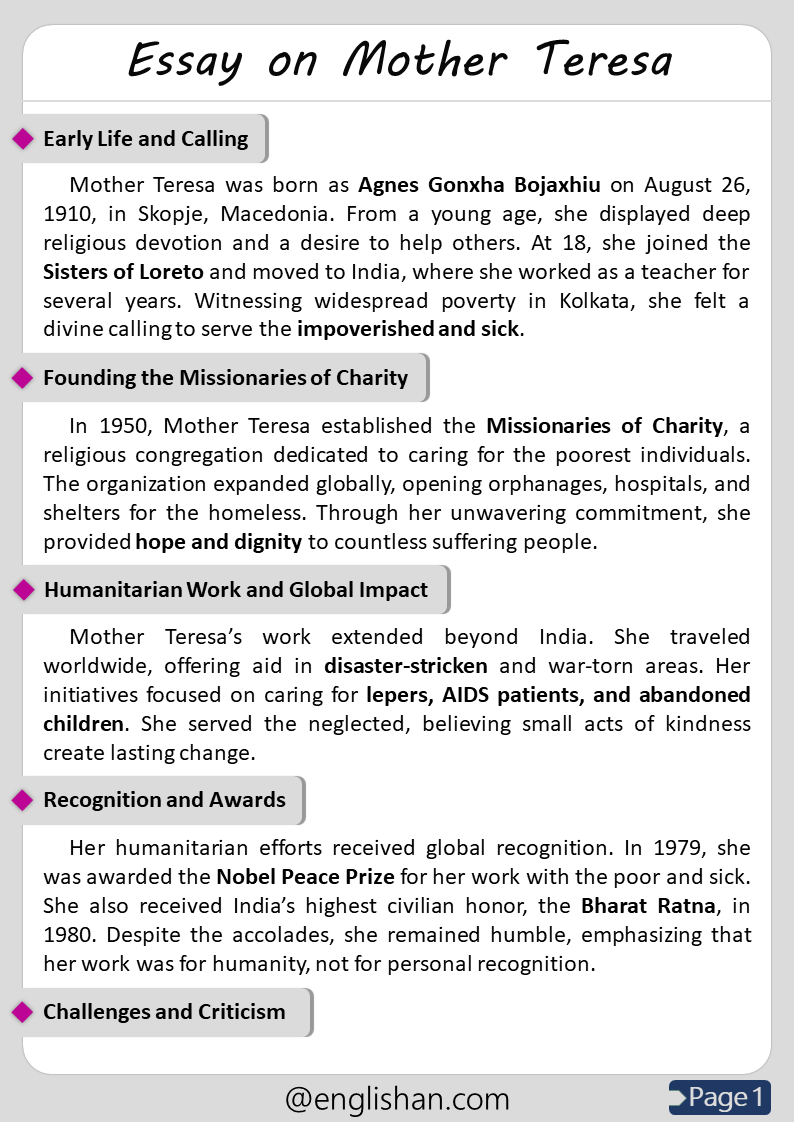When writing about Mother Teresa, it’s important to understand her role as a compassionate woman who dedicated her life to helping the poor and sick. This essay on Mother Teresa explains her early life, charitable work, and the impact she made through the Missionaries of Charity. It’s written in 250 words to help students with homework or exams. You can download this Mother Teresa essay as a free PDF or image to study or print.
10 Lines Mother Teresa Essay for Class 2 to Class 5
- Mother Teresa was a kind and caring woman.
- She was born in 1910 in Albania.
- Mother Teresa helped poor and sick people.
- She started a group called the Missionaries of Charity.
- She spent her life serving the needy.
- Mother Teresa won the Nobel Peace Prize in 1979.
- She worked mainly in India, especially in Kolkata.
- Many people respected her for her kindness.
- She taught people to love and help others.
- Mother Teresa is remembered as a symbol of love and care.

250 Words Essay on Mother Teresa for Middle School
Mother Teresa was a famous humanitarian known for her kindness and selfless service to the poor and sick. She was born in 1910 in Albania and later moved to India, where she spent most of her life helping people in need.
She founded the Missionaries of Charity, a group dedicated to caring for the poorest and the sickest people. Mother Teresa worked in Kolkata, where she opened homes for the homeless, hospitals for the sick, and centers for children and the elderly.
Her work earned her worldwide respect and recognition. In 1979, she was awarded the Nobel Peace Prize for her dedication to helping humanity. Mother Teresa’s life was an example of love, care, and devotion to others.
She taught people the importance of compassion and kindness. Even though she faced many challenges, she never gave up on her mission to serve the needy.
Mother Teresa’s legacy continues today through the Missionaries of Charity, which still works to help people around the world. She is remembered as a symbol of hope and love for millions of people everywhere.
500 Words Mother Teresa Essay for Upper Primary and Lower Secondary
Early Life and Calling
Mother Teresa was born as Agnes Gonxha Bojaxhiu on August 26, 1910, in Skopje, Macedonia. From a young age, she displayed deep religious devotion and a desire to help others. At 18, she joined the Sisters of Loreto and moved to India, where she worked as a teacher for several years. Witnessing widespread poverty in Kolkata, she felt a divine calling to serve the impoverished and sick.
Founding the Missionaries of Charity
In 1950, Mother Teresa established the Missionaries of Charity, a religious congregation dedicated to caring for the poorest individuals. The organization expanded globally, opening orphanages, hospitals, and shelters for the homeless. Through her unwavering commitment, she provided hope and dignity to countless suffering people.
Humanitarian Work and Global Impact
Mother Teresa’s work extended beyond India. She traveled worldwide, offering aid in disaster-stricken and war-torn areas. Her initiatives focused on caring for lepers, AIDS patients, and abandoned children. She served the neglected, believing small acts of kindness create lasting change.
Recognition and Awards
Her humanitarian efforts received global recognition. In 1979, she was awarded the Nobel Peace Prize for her work with the poor and sick. She also received India’s highest civilian honor, the Bharat Ratna, in 1980. Despite the accolades, she remained humble, emphasizing that her work was for humanity, not for personal recognition.
Challenges and Criticism
Despite her global admiration, Mother Teresa faced criticism regarding the quality of medical care in her facilities and the transparency of her organization’s finances. Some critics argued that her focus on suffering rather than alleviating pain was controversial. However, her unwavering commitment to the poor remained unquestionable. She responded to criticism with humility, stating that her mission was to serve, not to justify her work. She defended her approach by emphasizing the dignity of those in need and their right to compassionate care.
Influence on Modern Charitable Organizations
Mother Teresa’s model of selfless service has inspired numerous charitable organizations worldwide. Many humanitarian groups follow her principles of compassion and aid for the underprivileged, proving that her mission continues to impact global philanthropy.
Personal Life and Spiritual Devotion
Mother Teresa dedicated her entire life to religious service, adhering to a life of simplicity and sacrifice. She lived with the same humility as the people she served, demonstrating unwavering faith and devotion to her cause.
Canonization and Sainthood
In 2016, Mother Teresa was officially canonized as Saint Teresa of Calcutta by the Catholic Church. This recognition affirmed her lifelong service and dedication to humanity, cementing her place among the most revered religious figures in history.
Mother Teresa’s Impact on Healthcare
Mother Teresa’s efforts extended into healthcare, as she established hospices for the terminally ill and clinics for those without access to medical treatment. Her approach focused on offering comfort and dignity to those suffering, despite limited resources.
Mother Teresa’s Teachings on Kindness
She emphasized the importance of small acts of kindness and compassion in daily life. Her words and actions continue to inspire individuals to help others, regardless of their background or status.
Mother Teresa’s Work in Education
Along with her humanitarian work, Mother Teresa also promoted education for underprivileged children. Her schools provided basic literacy and moral teachings, offering many a chance at a better future.
Her Influence on Volunteerism
Mother Teresa’s selfless work encouraged thousands to engage in volunteerism. Many individuals and organizations have followed in her footsteps, dedicating their efforts to humanitarian causes.
Legacy and Influence
Mother Teresa passed away on September 5, 1997, leaving behind a legacy of love and compassion. Her teachings continue to inspire millions to engage in charitable acts and serve those in need. The Missionaries of Charity, which she founded, still operates globally, carrying forward her mission of selfless service.
Conclusion
Mother Teresa’s life serves as a testament to the power of kindness and humanitarianism. Her unwavering dedication to helping the underprivileged made her a beacon of hope for many. She proved that a single person’s compassionate efforts could transform countless lives. Her legacy remains an inspiration for generations to come.

Difficult Words Used in 500 Mother Teresa Essay
| Word | Meaning |
|---|---|
| Humanitarian | Concerned with promoting human welfare and social reform. |
| Impoverished | Extremely poor and lacking the basic necessities of life. |
| Canonized | Officially declared a saint by the Catholic Church. |
| Philanthropy | The desire to promote the welfare of others, often through donations. |
| Leprosy | A contagious disease causing skin lesions and nerve damage. |
| Altruism | Selfless concern for the well-being of others. |
| Orphanage | A residential institution for children without parents. |
| Legacy | Something handed down by a predecessor, often related to achievements. |
Mother Teresa Essay PDF
You May Also Like






